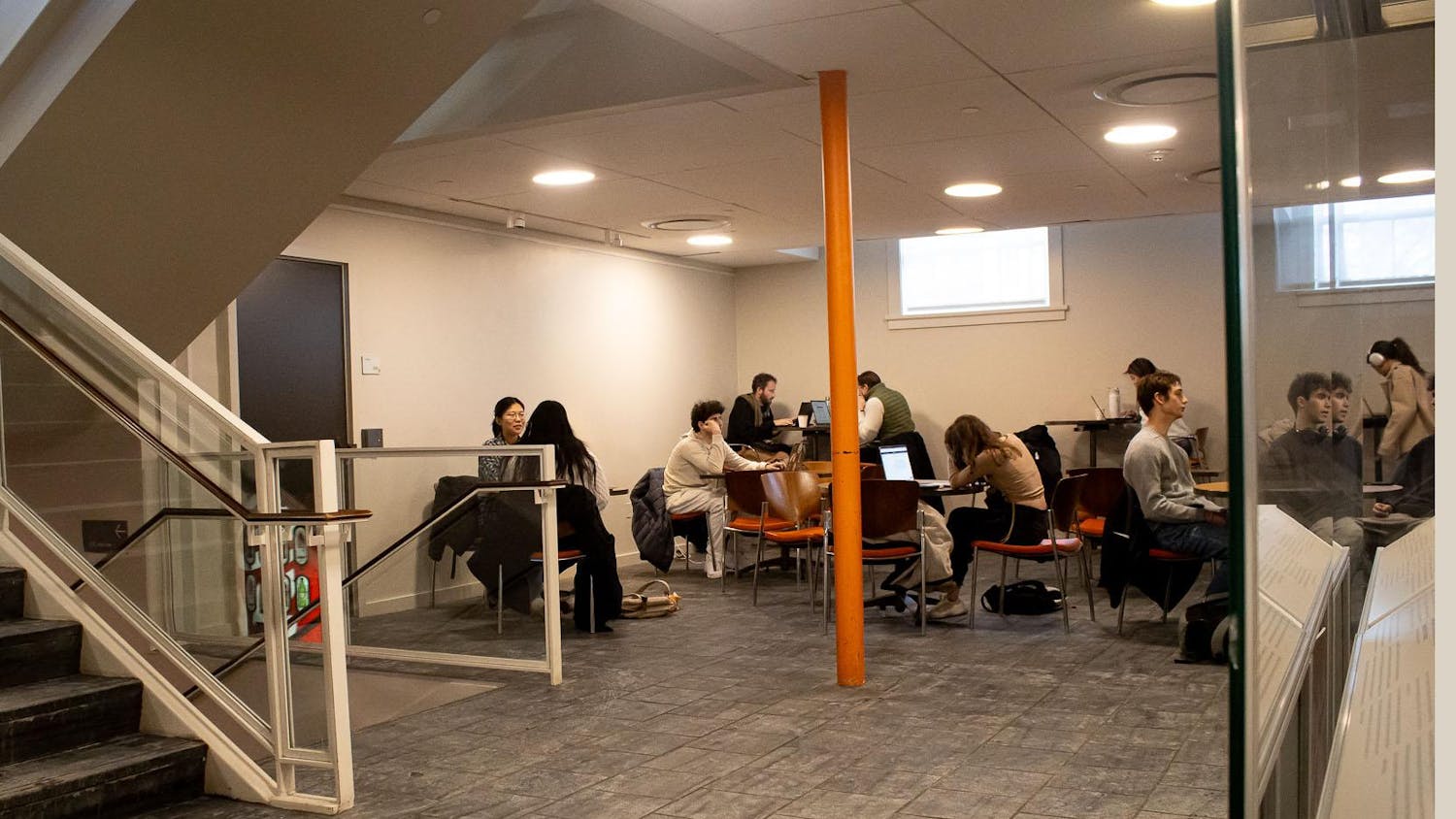After a group of current and recent University students accused Brown in a federal class action suit of systematically failing to protect students from sexual abuse and of intentionally deterring students from reporting incidents, the four plaintiffs — Chloe Burns ’19, Taja Hirata-Epstein ’20, Carter Woodruff ’22 and Katiana Soenen ’24 — have found themselves under a spotlight.
In an exclusive interview, the group spoke to The Herald explaining how they came together, what led them to file the suit and what they hope to come out of the case.
Barriers to reporting cases to Title IX
In the suit, all four women detailed their experiences of sexual assault, rape and harassment — and the difficulties they faced in bringing their cases to the Title IX office and the University administration at large.
For Woodruff, despite reporting an incident to the Office of Student Conduct, her assailant graduated “with no issue or repercussions,” she said.
Hirata-Epstein, in seeking to distance herself physically from her abuser, said she was denied permission to move off campus by the Office of Residential Life, and that she encountered a slow response rate from the Title IX office. Title IX later “heavily pressured” her into seeking an informal complaint process, as opposed to a formal complaint process, she alleged.
According to the Title IX Complaint Process, the formal complaint process, unlike the informal process, involves an investigation requiring witnesses, additional evidence and a hearing culminating in a sanction and decision from a panel composed of members from the Title IX Council. A complainant can pursue the informal process voluntarily if they have been “fully informed of all available options” and “has explicitly made that choice,” according to the Complaint Process.
Burns said the University retaliated against her after she spoke out about a sexual assault that occurred in 2016. Though a Title IX complaint found the assailant responsible, the assailant appealed — and was chosen to be a graduation speaker in the same time frame. According to the complaint, after Burns publicly detailed her assailant’s selection as a graduation speaker, the Title IX Office permitted her assailant to file a claim against her. Burns was then found responsible for retaliation.
“Getting formally punished for speaking about what happened to me really scared me off from talking publicly about myself or my experience with Brown’s process while I was still there,” Burns said. “As a student, I was still under (the University’s) jurisdiction, and I was afraid they would punish me even more.”
Soenen, in reporting two incidents to the Title IX office, was “discouraged from making a formal report” because the first incident occurred off campus; the office did not investigate the second incident, she said.
While Soenen was able to “ignore” what she saw as inadequacies in the process in her first reporting, she said, seeing the same mistakes repeated a second time exposed a much larger problem.
How the two incidents were handled, she said, “were really just manifestations of this massive systemic issue that we see at Brown.”
In an email to The Herald, Senior Vice President Cass Cliatt wrote that The University cannot comment on individual student cases for privacy reasons.
Coming together as plaintiffs
Woodruff, who is on leave from the University, had dedicated considerable time to activism, co-organizing the Instagram account Voices of Brown, which publishes anonymous accounts of sexual violence experienced on campus, and helping spearhead the End Sexual Violence campaign on campus this spring. (Woodruff, upon going public as a plaintiff in the suit, has since stepped down from her position with End Sexual Violence.) But after spending 40 to 60 hours a week over the course of last year attempting to push University administrators to shift policy, little had changed, she said.
“From an activist point (of view), it was so disheartening,” she added.
Soenen later reached out to Woodruff over a direct message on Instagram. As they talked, they came to realize that their experiences with the Title IX office were not unique — a lawsuit, they concluded, would be the only way to effect real change.
“We knew we had to be doing something different this time,” Woodruff said. “This comes after decades and decades of student activist efforts that have ultimately been ineffectual in enacting change on Brown’s campus.”
Finding plaintiffs, she added, did not present a major challenge.
“Between End Sexual Violence, Voices of Brown and my personal account, I have gotten droves of (direct messages) from various survivors,” Woodruff said.
When Woodruff raised the idea of a lawsuit to Burns and asked if she wanted to take part in it, Burns said she felt like she finally had an opportunity to use her experiences to make a difference for survivors at Brown.
‘Nothing else has really, truly worked’
Protest surrounding sexual assault at the University has a lengthy history: names of alleged rapists penned on the bathroom walls of the John D. Rockefeller Jr. Library, t-shirts hung on trees during family weekend and most recently, large-scale postering and protests.
But the plaintiffs say the University has failed to respond meaningfully to those efforts, and as students graduate and institutional memory of outrage fades, sexual violence remains pervasive on campus.
“This is a longstanding pattern,” Burns said. “It doesn’t seem like protests are working. Brown is waiting for that cycle of students to leave so they can keep doing what they’re doing, which is nothing. The impetus for choosing a lawsuit over other types of action is because nothing else has really, truly worked.”
Cliatt wrote that the University has made significant progress in confronting sexual violence in the last decade.
“We understand that it can be very difficult for students who were not here in 2014 when Brown began its aggressive actions to confront sexual violence to fully see the progress that reflects the University’s serious commitment to these issues,” she wrote. She cited the creation of the Title IX and Gender Equity Office, required education for first-year students, the University’s role in a national effort to survey students regarding sexual assault and misconduct, peer education programs and federal policy advocacy.
“Our record of action reflects a true commitment to confronting this critical societal issue,” Cliatt added. “We take it very seriously.”
Hirata-Epstein expressed hope that the suit would allow survivors to see that they “deserved better than what Brown could give them.” Burns said she hoped the lawsuit would result in student activists being able to “critique” the University without fear of retaliation.
In addition to seeking damages, the suit also calls for an injunction that overhauls the University’s Title IX office, ensuring “strict compliance” with the civil rights statute.
“As a woman of color, I think there’s a normalization of violence toward women of color,” Hirata-Epstein added. “Outside of the policy changes and the cultural shift we want … I want especially women of color, but generally survivors, to know that what happened to them mattered, and that someone at the University should be taking it seriously.”
After the suit made headlines Monday, Woodruff said she was “incredibly encouraged” that the media covered the suit as a structural issue at the University, rather than sensationalizing their specific sexual assault cases.
Woodruff also posted about her path toward filing the suit and expressed gratitude for other campus activists on her personal Instagram account, which garnered widespread support from Brown community members in the form of likes and shares on people’s stories.
“It was so beautiful to see how many students at Brown, many of whom I don’t know personally, are coming out and supporting this,” she said. “It’s a testament to the support … and the widespread suffering our community has felt for too long.”
All four women hope that the suit will validate and empower young women who have dealt with similar experiences. They want other survivors to know that their voices and experiences matter, even if the University makes them feel otherwise.
“For every single person who tries to silence you, there are also hundreds of people out there that are ready to support you, especially at Brown right now,” Woodruff said. “We as plaintiffs, as well as so many other students at Brown, are here as your support network.”

Gaya Gupta was Senior Editor of Digital News for the 132rd Editorial Board. She previously covered diversity on campus. She is a junior from the San Francisco Bay Area studying computer science and English.

Will Kubzansky was the 133rd editor-in-chief and president of the Brown Daily Herald. Previously, he served as a University News editor overseeing the admission & financial aid and staff & student labor beats. In his free time, he plays the guitar and soccer — both poorly.





